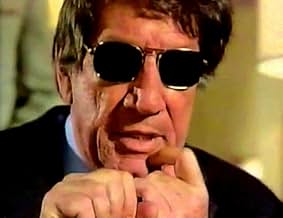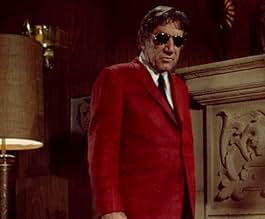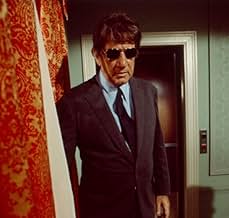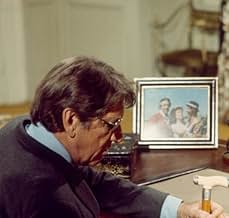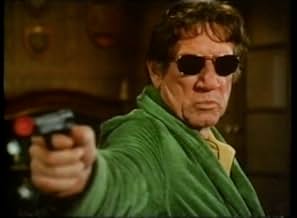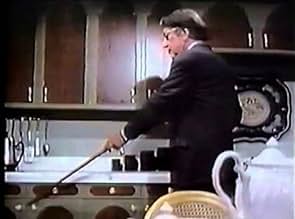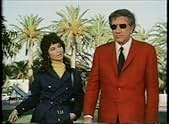A blind actor discovers his wife is cheating on him with his best friend, and hatches a plot to murder them both.A blind actor discovers his wife is cheating on him with his best friend, and hatches a plot to murder them both.A blind actor discovers his wife is cheating on him with his best friend, and hatches a plot to murder them both.
Dan Spelling
- Teenager
- (as Daniel Spelling)
Frank Bello
- Sgt. Wilkes
- (uncredited)
Barbara Dodd
- Mother
- (uncredited)
Jack Riley
- Cab Driver #3
- (uncredited)
- Director
- Writer
- All cast & crew
- Production, box office & more at IMDbPro
6.8286
1
2
3
4
5
6
7
8
9
10
Featured reviews
Excellent 70's Thriller
I saw this in the 1970's and recently viewed it again...it is still enjoyable. Richard Boone is great as a blind actor who plots revenge on his unfaithful wife played by Stella Stevens. Suzanne Pleshette and John Marley also play key roles. There is lots of suspense and LA scenes.
Blind man makes unfaithful wife pay
John Marley must have played his role in IN BROAD DAYLIGHT just before his most famous role of all as Jack Woltz in THE GODFATHER. As is well known, criminals always think themselves cleverer than the policemen investigating them, and that is exactly the case here: Richard Boone, portraying fairly convincingly an actor and movie director who has gone blind, catches his wife having intimacy with his best friend and decides to ice her and make the adulterous pal the culprit.
Needless to say, a blind man is bound to make more mistakes than a normal person, even one of poor eyesight, and in this instance he makes the mistake of taking his therapist's umbrella.
Suzanne Pleshette plays that therapist - a small and largely meaningless part, rather sad to watch. She helps with advice and a guide dog, but ends up compromising her client twice by speaking too much and coming back searching for her brolly.
That is where Marley proves the superior intelligence of the copper, immediately pouncing on the fact that Pleshette had lost her umbrella and linking it to the Greek fella who went into Boone's wife's hotel with the umbrella that only the porter saw. (Puzzled as to the reason for linking a missing brolly to a fellow no one could identify? So am I!)
Of course, blind Boone makes the classical mistake of returning to the scene of the crime... and catching the wrong taxi.
Passable TV entertainment that does not tax your brain cells.
Needless to say, a blind man is bound to make more mistakes than a normal person, even one of poor eyesight, and in this instance he makes the mistake of taking his therapist's umbrella.
Suzanne Pleshette plays that therapist - a small and largely meaningless part, rather sad to watch. She helps with advice and a guide dog, but ends up compromising her client twice by speaking too much and coming back searching for her brolly.
That is where Marley proves the superior intelligence of the copper, immediately pouncing on the fact that Pleshette had lost her umbrella and linking it to the Greek fella who went into Boone's wife's hotel with the umbrella that only the porter saw. (Puzzled as to the reason for linking a missing brolly to a fellow no one could identify? So am I!)
Of course, blind Boone makes the classical mistake of returning to the scene of the crime... and catching the wrong taxi.
Passable TV entertainment that does not tax your brain cells.
Very enjoyable...though completely far-fetched.
"In Broad Daylight" is an enjoyable made for TV movie, but in order to get the most of it you really need to suspend that nagging voice within you telling you how ludicrous the story really is. This is not a huge problem...but the story is very difficult to believe.
Tony (Richard Boone) is a famous actor who recently lost his sight. As a result, he's working with a therapist (Susanne Pleshette) to learn to adapt to everyday life. However, during this time Tony learns that his wife is cheating on him and so he concocts a complicated plan. First, he starts pretending to do poorly with his rehab--pretending to get lost and having great difficulties finding his way outside his apartment. In reality, he's VERY adept at such things. Second, he works out an intricate plan to go to his lawyer's apartment and kill his wife since that's her lover. But to do this, he dons makeup and pretends to be a nice Greek man who can see just fine. While it seems to work very well, a cop investigating the case (John Marley) is determined to find out who killed Tony's wife.
There are 1001 different problems which could have arisen during the complicated drip to and from the lawyer's home. Yet, inexplicably, Tony does a near perfect job...something a blind person MIGHT be able to pull off but unlikely....and even more unlikely since he only recently lost his sight. Additionally, the umbrella angle came off as a bit silly--particularly when Tony goes to retrieve it. Still, despite all this, it's an interesting little made for TV film and never bores.
Tony (Richard Boone) is a famous actor who recently lost his sight. As a result, he's working with a therapist (Susanne Pleshette) to learn to adapt to everyday life. However, during this time Tony learns that his wife is cheating on him and so he concocts a complicated plan. First, he starts pretending to do poorly with his rehab--pretending to get lost and having great difficulties finding his way outside his apartment. In reality, he's VERY adept at such things. Second, he works out an intricate plan to go to his lawyer's apartment and kill his wife since that's her lover. But to do this, he dons makeup and pretends to be a nice Greek man who can see just fine. While it seems to work very well, a cop investigating the case (John Marley) is determined to find out who killed Tony's wife.
There are 1001 different problems which could have arisen during the complicated drip to and from the lawyer's home. Yet, inexplicably, Tony does a near perfect job...something a blind person MIGHT be able to pull off but unlikely....and even more unlikely since he only recently lost his sight. Additionally, the umbrella angle came off as a bit silly--particularly when Tony goes to retrieve it. Still, despite all this, it's an interesting little made for TV film and never bores.
Worthy Early 70s Crime Drama
Must disagree with the previous reviewer, who apparently only accepts Ingmar Bergman and Fellini as art and can't appreciate a good meat and potatoes thinking man's thriller when he sees it. IN BROAD DAYLIGHT isn't Fellini but it is definitely a suspenseful and rewarding early 70s crime drama featuring a memorable turn by Richard Boone as a blind man who pretends to be sighted in order to kill his philandering wife. Solid cast includes the timeless Stella Stevens, Suzanne Pleshette and Whit Bissell, all of whom turn in good performances. Perhaps there aren't the requisite car chases and gunplay associated with typical 70s crime drama, but this quieter revenge story is still absorbing and compelling from start to finish. More than anything, though, this is a character study of Boone's blind man coping with the realization of his betrayal and coldly calculating how to transform his helplessness and hatred into advantage and revenge. The clever premise is bolstered by real tension throughout and a satisfying Ulmeresque Detour-like ending, despite the previous reviewer's odd dismissal.
This was actually a TV-movie produced by Aaron (LOVE BOAT, CHARLIE'S ANGELS, MELROSE PLACE, etc.) Spelling before he took up the lowest common denominator jiggly soap opera / action adventure mantle which built his 250-room Palace of Versailles in Beverly Hills. Too bad Aaron didn't continue down this darker, less commercial but more intriguing road, which tells the bleak story of a bright man who refuses to live his life in the dark. Spelling might not have built his huge palace making movies like this, but he'd certainly still have wound up with a couple ten bedroom mansions and a beach house, and we'd have a far superior filmography to enjoy. 8.5 /10
This was actually a TV-movie produced by Aaron (LOVE BOAT, CHARLIE'S ANGELS, MELROSE PLACE, etc.) Spelling before he took up the lowest common denominator jiggly soap opera / action adventure mantle which built his 250-room Palace of Versailles in Beverly Hills. Too bad Aaron didn't continue down this darker, less commercial but more intriguing road, which tells the bleak story of a bright man who refuses to live his life in the dark. Spelling might not have built his huge palace making movies like this, but he'd certainly still have wound up with a couple ten bedroom mansions and a beach house, and we'd have a far superior filmography to enjoy. 8.5 /10
Did you know
- TriviaA potential remake with Andrea Bocelli was planned, but didn't work out in the end.
- Quotes
Anthony Chapel: A funny thing happened on the way to the murder.
- ConnectionsReferences Mary Poppins (1964)
Details
- Release date
- Country of origin
- Language
- Also known as
- Am hellichten Tag
- Filming locations
- Pacific Coast Highway, Malibu, California, USA(Tony Chappel in disguise walks onto the '84 bus east')
- Production companies
- See more company credits at IMDbPro
- Runtime
- 1h 15m(75 min)
- Color
- Aspect ratio
- 1.33 : 1
Contribute to this page
Suggest an edit or add missing content

